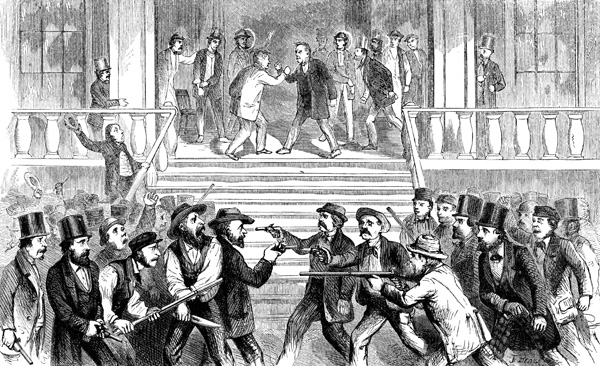The 19th Century(long overdue)
It's the time when Darwin formulated his theory on evolution, when the west coast of America was a new frontier to explore, and when Romanticism dominated the minds of men.
But one of the most important event in this century is America's abolition of slavery under the presidency of Lincoln. It is an event well-known by most of America and the rest of the world: there was slavery, Lincoln came to be president, Lincoln ends slavery, South rebels, and Lincoln defeats the Confederate South. There. Done.
Not really.
What about social thought in this time period? And was it really so black and white to Lincoln, the North and the South?
When Lincoln ascended to presidency, the entire nation was in turmoil. He was considered a moderate Republican, and had criticism from both ideological ends of political parties. And although Lincoln is considered one of the greatest heroes of abolitionism, he did not ascend to presidency to end slavery. He ascended to end the split in America between the North and the South.
Lincoln decided he had to either choose between ending slavery or supporting it. He could not follow the example of past presidents and take no stance when it comes to slavery. Avoiding the problem had caused even more chaos, like with the Kansas-Nebraska Act. This act, enacted in 1854, held the provisions that the new states, Kansas and Nebraska, were to become either "slave states" or "free states" by popular sovereignty. This means that when the state was populated enough, there would be a vote, and whatever was more popular would become the law for that state.
This led to zealous political party members of both sides rushing to Kansas and Nebraska to be able to get the state to be on their side. Abolitionists and slavery enthusiasts of all kinds rushed to these states, and immediately the tension in these states rose. With such strong opposition all in one state, these political zealots resorted to physical harm. Civil battles broke out in Nebraska, and much more strongly in Kansas. These battles and the resulting chaos became known as "Bleeding Kansas."
All of this bloodshed resulted from presidents who were afraid to take a stance in fear of losing political support. Lincoln was sure to not make that same mistake.
He had to take a stance. And it is lucky for us that he chose to take the morally correct standpoint of anti-slavery.
Lincoln took direct control of the government when the South seceded and became the Confederacy. He used his executive position to imprison anyone who opposed his war on anti-slavery, and used all of his power to fight the South and end their rebellion.
With this full-scale war, many people died on both sides, especially at the Battle of Gettysburg.
With the end of the Battle at Gettysburg, Lincoln made his famous Gettysburg address, reminding everyone to be thankful for what they have. It's interesting to see Lincoln tell people to be thankful at the site where thousands of men died. Did he make those remarks with a bitter and ironic undertone to the battles that happened, or did he really want Americans to find things to be thankful for in this time of war and loss? (I'm going to believe it's the second option)
Either way, Lincoln is one of the most interesting presidents to date, despite his extreme use of executive power to take control. His control and power helped unify America once more.
So it makes me wonder if complete control is a bad thing? Like with SOPA or PIPA. I mean, it is trying to serve in the best interests of the people. It blocks bad things like illegal downloads and torrents so that the people will be paid for their work. However, controlling the internet is not a nation-threatening situation, like the Civil War was.






No comments:
Post a Comment